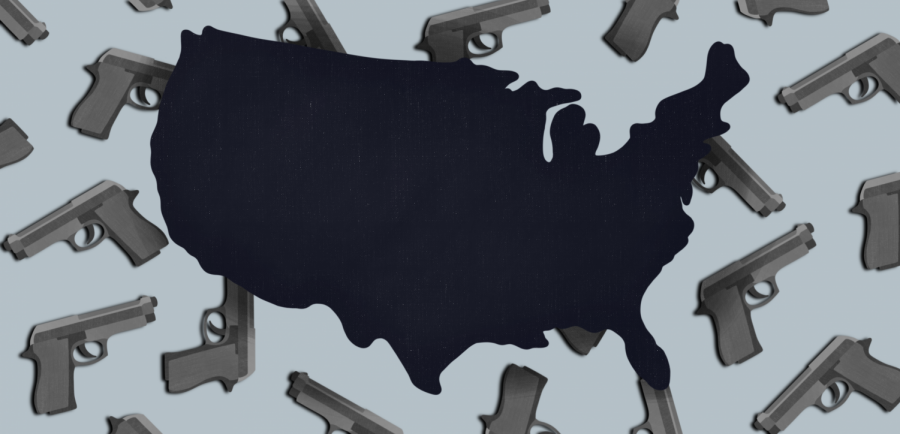Editorial | Gun culture inflames armed violence
Apr 15, 2021
America is addicted to its guns. Besides leading the world in gun-related killings, the U.S. also dangerously shepherds the world with immense gun ownership.
This debilitating fascination, judicially protected by the Second Amendment, contributes to America’s present predicament: nearly 316 Americans shot daily, with 106 dying from those strikes.
Furthermore, the sustained inaction by government leadership is an incredible failure not only to the concept of American exceptionalism but as well as a vehement disservice to those continuously dying of gun violence.
Correspondingly, a societal firearm fetishism penetrates through the American veil in more than disgraceful violence. Legitimate reform towards gun control in the U.S. requires lofty legislation and, now, a cultural comprehension of America’s darkest obsession.
Gun control — legislatively neglected — remains the first step in repairing this corrupted culture. Overdue solutions such as universal background checks, closing various loopholes and limiting access to firearms are certainly the highest pressing concerns. Despite legislation that may diminish this violence, the issue of individuals prime to shoot fellow citizens endures.
Following 2018’s Parkland shooting, journalist and veteran Andrew Exum noted in The Atlantic that “watching reactions to the Parkland shootings, I am more confident than ever that America has a bigger problem with gun culture than it has with guns themselves.”
Additionally, Exum chronicled that 2004’s expiration of the 1994 assault weapon ban and America’s post 9/11 era “have combined to drive sales in the kinds of weapons that would have appeared frankly insane for the individual gun owner just a few years earlier.”
Since ‘04’s dismal expiration and the tragedy of 9/11, the U.S.’s culture has prioritized itself with individual protectionism: “If it’s every man for himself, I might as well buy a gun.” This menacing conviction — further capitalized by the likes of weapon manufacturers/sellers — permeates and kidnaps the American psyche from achieving any progress against violence.
Subsequently, Exum also asserted increasing tribalism surrounding firearm possession in the post 9/11 era: “People began to accumulate small arms less out of devotion to hunting or other shooting sports but rather because the process of buying firearms was an important cultural signifier.”
In contemporary America, various societal actors push patriotism onto firearm ownership. Those who dare contend that gun control is crucial are deemed “anti-American,” whereas individuals who flaunt their firearms are selectively perceived as patriotic and fervently American. Labeling fellow citizens with various titles based on their gun beliefs is futile.
Tribalism — by way of gun preferences — is counterproductive to any effort combating the crisis of gun violence. This purposeless case of polarization, moreover, embodies the current pervasiveness of guns: a grip so powerful, society is congested with firearm lingo.
In 2013, the National Public Radio recorded then-Vice President Joe Biden ending a meeting on curbing gun violence with Biden stating, “We know that … there is no silver bullet.” Later, when questioned on when a proposal would arrive, “I’m shooting for Tuesday.”
These otherwise simple demonstrations of firearm-related metaphors reflect a grander attachment in society. Whether it is calling for “shotgun” in a friend’s car or grumbling about “sweating bullets” on a hot day, American speech is embedded with gun metaphors.
Acknowledging this hold arms possess in speech, it becomes painfully obvious gun control will only exist once America comprehends its vicious dependency. A nation reliant and immersed with firearms — both dictated in the Constitution and omnipresent in its streets and speech — is not equipped to disentangle this prolonged predicament.
A question is then posed of what incentivizes a person to retain a firearm in the first place? According to a 2017 Pew Research Center survey, about 40% of Americans live in a gun-owning household. With such a large volume of owners, adequate response lies in realizing the U.S. still suffers from bitter distrusts of its institutions and purported protection.
The answer, therein: An assumption of individual protection. The problem: With scores adopting this mentality, individuals perceive others as threats rather than fellow beings. A continued problem: Americans, eventually, associate safeguarding with hazardous firearms.
As now-President Biden once remarked, “there is no silver bullet” in alleviating gun violence. There will be no all-encompassing legislation — especially under polarized times — that settles this brutality. The best one can do in these tumultuous times, however, is to legislatively and publicly identify and respond to this cultural addiction afflicting the U.S.
Although Biden newly declared this viciousness a “public health epidemic,” proceeding steps in combating the cruelty necessitates a societal apprehension.
America’s attachment to firearms punishes all. Akin to any addict confronting one’s tribulations, admitting this cultural fixation on firearms services no one is the first step. Only then, will America proceed in its arduous voyage recovering from this armed epidemic.






